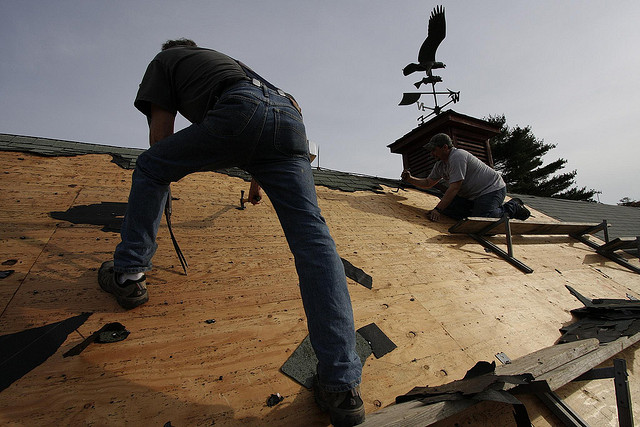Not long after he bought his company, Ed Ladouceur was working on a roofing job and forgot to tell the homeowner something important. Cover and protect any and all items in your attic that may be damaged. When Ladouceur’s crew tore layers of shingles away, dirt, dust, bits of underlayment, and lots of stone granules spilled down through openings in the roof structure into the attic. The homeowners weren’t pleased, and they let the business owner know that.
“They were absolutely right,” says the owner of Stormtite Home Improvement, in Warwick, RI, who sent a crew back to the house to do an attic clean-up that included thorough vacuuming.
What’s Expected
There’s ample opportunity for mishaps a once roofing, siding, or window crew gets busy. Certain precautions that homeowners take can minimize that. Today, more than 20 years after dirt rained into that attic, Stormtite distributes a simple “To Do” list detailing what customers must do to ensure that furnishings, landscaping, or other items don’t get damaged. The list instructs window replacement customers to remove window treatments, disconnect alarms, and remove breakables from the window area; for siding projects it asks them to protect landscaping, remove breakables, and supply an outside outlet; and for roofing customers it includes the “cover and protect” instruction mentioned earlier and asks them to assign space in the driveway for a dumpster but otherwise keep the driveway clear.
You might think these are just common sense precautions. But homeowners are often “completely unaware they have anything to do,” says Jeffrey Fick, vice president of marketing and sales for Fick Bros., an exterior remodeling company in Baltimore. “They expect that because you’re the contractor, you’ll take care of things.”
Aligning Realities
Fick Bros. uses a series of forms to communicate to homeowners what’s going to happen and what they can do to mitigate some of that. First there’s the 34-item “Contract Review Checklist,” which covers everything from noise, dirt, and lead paint to change orders and porta-potty location (should the job last long enough to need one). Salespeople go through it at contract signing, and customers sign the form.
Fast forward to the week that work starts, when project managers take clients through a second, 30-item checklist at a preconstruction meeting. Items such as plaster cracking, dirt falling in the attic, and bathroom facilities are discussed again.
“We want to align their expectations with reality,” Fick says.
For example, Fick Bros. informs clients that the company is not an arborist, and that if tree branches block access to some portion of the roof, it’s the homeowner’s responsibility to have them removed.
The psychology is not complicated. When homeowners are informed they have certain obligations, they willingly comply. When they’re aware of the possibility of certain installation mishaps, they don’t get irritated when and if something goes wrong.
In addition to these two checklists, Fick Bros. sends homeowners its Before Installation Brochure, which explains the clients’ responsibility to move cars and protect outside furniture and shrubbery.
Eliminate Surprises
If such precautions seem excessive, consider that every item on these lists is there because of a direct experience with a homeowner. And although contractors might tell homeowners that they need to act to protect their property and possessions, and hand them a checklist, that doesn’t mean anyone’s listening. Explaining it multiple times and securing a signature are the only sure ways to get the message through. “We don’t want any surprises,” Ladouceur says.
Even so, customers are still sometimes taken aback. A few weeks ago a roofing client complained to Fick Bros. about the amount of dirt that had fallen into his attic. “I apologized,” Fick says, “but I reminded him that the salesman and foreman had told him about it and that we’d sent the brochure. He said, ‘Yes, everybody told me but I never realized it was that much.’”
Though customers are expected to do their part, companies make exception for the elderly and disabled. The Board Store Home Improvements, in LaCrosse, Wis., relies on its job scheduler to inform customers of the need to remove window treatments and furniture from around window openings or to clear the attic area. If customers aren’t able to do that, it becomes the crew’s responsibility “as a courtesy,” owner Miles Wilkins says. But the crew, knowing in advance, can plan for the extra time to do that.



